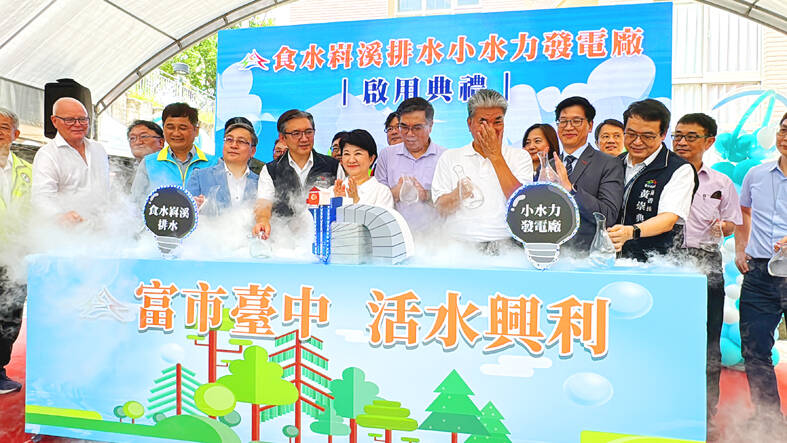A small-scale hydrogen power plant in Taichung, the first of its kind in Taiwan initiated by a local government, began operating on Wednesday.
The Shishuike River Small Hydropower Plant has an installed capacity of 185 kilowatt-hours (kWh), meaning it can sell about 1,000 renewable esnergy certificates a year, Taichung Mayor Lu Shiow-yen (盧秀燕) said during the opening ceremony for the plant.
Each certificate represents 1,000kWh of green power generated from renewable sources and can reduce carbon emissions by about 0.5 tonnes.

Photo: Ou Su-mei, Taipei Times
The green energy generated by the plant and the renewable energy certificates are to be sold to Delta Energy, a subsidiary of Delta Electronics, Lu said.
The core services of Delta Energy include assisting businesses in procuring green energy and achieving zero carbon goals, the company said.
BOT MODEL
Lu said the project was launched based on the build, operate and transfer (BOT) public-private partnership model, under which the city signed a 20-year cooperation contract with partner companies investing in the building of the plant, which would be transferred to the city government after 20 years of operation.
She also touted the city government’s efforts to promote renewable energy, saying that all government offices and schools in Taichung are required to have solar panel installations on their rooftops.
More than 85 percent of schools in the city have installed solar panels, she added.
The city’s renewable power generation reaches 2.56 billion kilowatt-hours every year, which is equivalent to one-third of the power generated by the Taichung Thermal Power Plant, Lu said.
LEARNING EXPERIENCE
Minister of Environment Peng Chi-ming (彭啟明) said that the Taichung City Government’s experiences in combating climate change can be used as a reference by other local governments.
A transition to renewable energy is essential to mitigating climate change, Peng said, adding that while small-sized hydropower plants can generally produce only small amounts of power, they can generate great benefits cumulatively.
Peng added that he hoped the first local government-initiated small hydropower project would attract more to emulate it.
As for renewable energy certificates, Peng said that after companies purchase green electricity certificates, they can be used to offset carbon fees in the future, as Taiwan has yet to set a carbon fee rate.
To cope with future carbon tariffs, companies would work hard to achieve net zero, creating a promising market for green certificates, he said.

US climber Alex Honnold is to attempt to scale Taipei 101 without a rope and harness in a live Netflix special on Jan. 24, the streaming platform announced on Wednesday. Accounting for the time difference, the two-hour broadcast of Honnold’s climb, called Skyscraper Live, is to air on Jan. 23 in the US, Netflix said in a statement. Honnold, 40, was the first person ever to free solo climb the 900m El Capitan rock formation in Yosemite National Park — a feat that was recorded and later made into the 2018 documentary film Free Solo. Netflix previewed Skyscraper Live in October, after videos

Starting on Jan. 1, YouBike riders must have insurance to use the service, and a six-month trial of NT$5 coupons under certain conditions would be implemented to balance bike shortages, a joint statement from transportation departments across Taipei, New Taipei City and Taoyuan announced yesterday. The rental bike system operator said that coupons would be offered to riders to rent bikes from full stations, for riders who take out an electric-assisted bike from a full station, and for riders who return a bike to an empty station. All riders with YouBike accounts are automatically eligible for the program, and each membership account

NUMBERS IMBALANCE: More than 4 million Taiwanese have visited China this year, while only about half a million Chinese have visited here Beijing has yet to respond to Taiwan’s requests for negotiation over matters related to the recovery of cross-strait tourism, the Tourism Administration said yesterday. Taiwan’s tourism authority issued the statement after Chinese-language daily the China Times reported yesterday that the government’s policy of banning group tours to China does not stop Taiwanese from visiting the country. As of October, more than 4.2 million had traveled to China this year, exceeding last year. Beijing estimated the number of Taiwanese tourists in China could reach 4.5 million this year. By contrast, only 500,000 Chinese tourists are expected in Taiwan, the report said. The report

Temperatures are forecast to drop steadily as a continental cold air mass moves across Taiwan, with some areas also likely to see heavy rainfall, the Central Weather Administration (CWA) said. From today through early tomorrow, a cold air mass would keep temperatures low across central and northern Taiwan, and the eastern half of Taiwan proper, with isolated brief showers forecast along Keelung’s north coast, Taipei and New Taipei City’s mountainous areas and eastern Taiwan, it said. Lows of 11°C to 15°C are forecast in central and northern Taiwan, Yilan County, and the outlying Kinmen and Lienchiang (Matsu) counties, and 14°C to 17°C